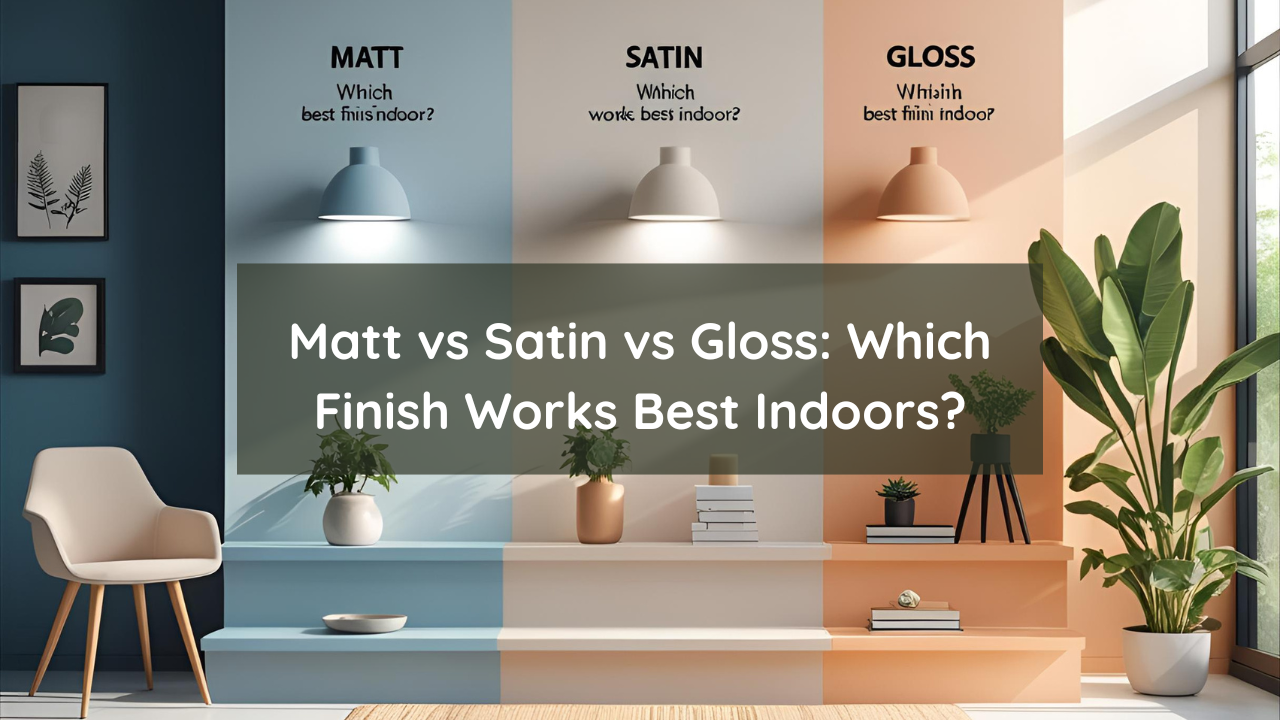Choosing the right paint finish is just as important as selecting the perfect color. Whether you’re painting a bedroom, kitchen, or living room, the sheen of your paint can dramatically affect how the space looks, feels, and holds up over time. The most common options — matt, satin, and gloss — each have their unique characteristics and best-use cases. In this guide, we break down the key differences, benefits, and ideal applications for each finish to help you make the best decision for your interior spaces.
Overview: Comparison of Paint Finishes
| Finish Type | Sheen Level | Durability | Best For | Washability | Light Reflection |
|---|---|---|---|---|---|
| Matt | Flat, no shine | Low to medium | Bedrooms, ceilings, low-traffic walls | Low | Minimal |
| Satin | Soft sheen | Medium to high | Living rooms, hallways, kids’ rooms | Moderate | Gentle glow |
| Gloss | High shine | Very high | Kitchens, bathrooms, trim & doors | Very high | Maximum |
1. Matt Finish – Smooth, Subtle, and Sophisticated
Matt (or flat) paint provides a velvety, non-reflective finish that hides surface imperfections beautifully. It’s perfect for creating a calm, elegant look, especially in low-traffic areas.
Advantages:
- Hides wall blemishes and uneven textures.
- Provides a rich, deep color tone.
- Non-distracting for spaces meant to feel cozy or moody.
Disadvantages:
- Less durable; easily scuffed or marked.
- Not ideal for areas prone to dirt, moisture, or fingerprints.
Best Used In:
- Bedrooms
- Adult living spaces
- Ceilings
2. Satin Finish – The Balanced All-Rounder
Satin offers a soft sheen that strikes the perfect middle ground between flat and glossy. It’s one of the most versatile finishes, offering a bit of light reflection without being too shiny.
Advantages:
- Easy to clean, making it family-friendly.
- Slightly reflective, enhancing natural light.
- Shows more color depth than matt.
Disadvantages:
- Slightly highlights wall imperfections.
- Needs careful brushwork to avoid lap marks.
Best Used In:
- Hallways and corridors
- Children’s rooms
- Living rooms
- Kitchens with moderate moisture
3. Gloss Finish – Bold, Bright, and Built to Last
Gloss is the most durable and shiny of all finishes. It reflects a lot of light and is highly resistant to stains and moisture, making it ideal for high-traffic or high-moisture areas.
Advantages:
- Extremely durable and easy to clean.
- Moisture-resistant, ideal for kitchens and bathrooms.
- Adds energy and sharpness to trim or doors.
Disadvantages:
- Highlights every flaw or brushstroke.
- Can be too reflective for large wall surfaces.
Best Used In:
- Doors and window frames
- Kitchen backsplashes
- Bathrooms
- Cabinetry
Paint Finish Selection Table by Room
| Room Type | Recommended Finish | Reason |
|---|---|---|
| Bedroom | Matt or Satin | Calm atmosphere and soft texture |
| Kitchen | Gloss or Satin | Washability and moisture resistance |
| Bathroom | Gloss | High humidity tolerance |
| Living Room | Satin | Balance of elegance and durability |
| Ceiling | Matt | Non-reflective and smooth look |
| Hallways | Satin | Easy to clean, durable finish |
Key Factors When Choosing a Finish
- Lighting: Gloss finishes reflect more light; matt absorbs it.
- Traffic: Use satin or gloss in high-traffic areas for durability.
- Surface Quality: Choose matt to conceal flaws; gloss if surfaces are smooth.
- Cleaning Needs: Gloss is best for surfaces that require frequent cleaning.
Conclusion
Choosing between matt, satin, and gloss comes down to the purpose of the room, the condition of your walls, and the desired look. If you want softness and elegance, go with matt. For a versatile, family-friendly option, satin is your best bet. And for high-impact, durable shine — especially in kitchens and bathrooms — gloss wins hands down. The right finish doesn’t just complete your color—it enhances your space’s personality, performance, and polish.
FAQs
Q: Which paint finish hides wall imperfections best?
Matt finish is ideal for concealing wall flaws due to its low reflectivity.
Q: Is satin or gloss better for kitchens?
Gloss is more durable and moisture-resistant, but satin works well for a softer look.
Q: Can I use gloss paint on walls?
Yes, but it’s best used sparingly—on accent walls or in moisture-prone areas.

